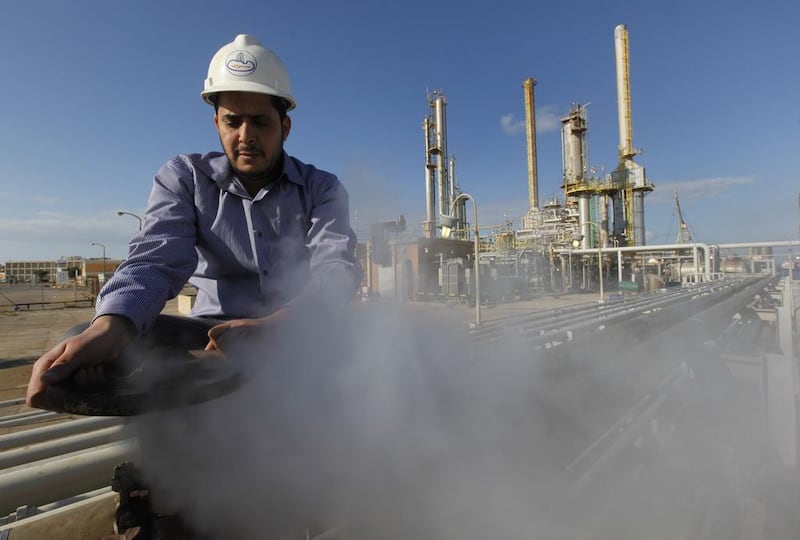Paris // The mood was gloomy among the diplomats gathered on Monday in Paris at the invitation of French foreign minister Jean-Marc Ayrault to discuss how to bring peace to Libya.
With Mr Ayrault were representatives from Britain, Germany, Italy, Qatar, the UAE, the United States together with the UN special envoy to Libya, Martin Kobler, and European Union foreign policy chief Federica Mogherini, all perplexed by a simple problem: The capture of Libya’s key oil ports last month by Field Marshall Khalifa Haftar, commander of the army of the national parliament, the House of Representatives in Tobruk.
This operation, staged between September 11 and September 14 by Haftar’s Libya National Army wrestled control of the ports of El Sidra, Ras Lanuf, Brega and Zueitina from control of a militia, the Petroleum Facilities Guard loyal to parliament’s rival, the UN-backed Government of National Accord (GNA) in Tripoli.
At a stroke, the operation changed the balance of power in Libya, leaving parliament controlling the Sirte Basin, which is home to more than two thirds of the country’s oil.
The first international reaction to the ports operation was condemnation: On September 12 the United States, France, Germany, Britain, Italy and Spain signed a joint statement warning the operation would invite further fighting, and demanding Field Marshall Haftar withdraw.
The commander ignored the demand, and since the statement, two things have happened. First, the GNA, based in Tripoli, has ruled out an operation to take back the ports, bringing temporary peace to the region. Second, oil exports have surged.
Mustafa Sanallah, respected chief of the National Oil Corporation (NOC) announced on September 14 his support for Field Marshall Haftar’s move.
By September 28 Bloomberg was reporting that Libya’s oil exports which had been 260,000 barrels per day (bpd) in August had surged to 485,000 bpd. The same day, Germany’s Wintershall oil company announced resumption of deliveries of 35,000 barrels a day to the port of Zueitina the first since last November.
Then on Tuesday, Arabian Gulf Oil Company (Agoco), the largest state-owned oil firm in eastern Libya, announced production had increased to 320,000 bpd from 290,000 bpd a week before. Mr Sanallah said in September he hopes that production will reach 900,000 bpd by the end of the year.
This is a long way from the 1.4 million bpd Libya enjoyed before civil war broke out in July 2014, but is a significant boost to national revenues.
The problem for the international community is that this production is controlled by the House of Representatives in Tobruk, which has refused to cooperate with the GNA in Tripoli.
In August, the House voted against a proposed unity cabinet offered by GNA prime minister Fayez Al Serraj, with many demanding that Field Marshall Haftar remain as army commander, a demand Al Serraj refused. He knows this demand is likely to be unacceptable to Libya Dawn, a coalition of militias including Islamists and fighters from Misurata who control Tripoli.
Field Marshall Haftar, for his part, has rejected the idea of working with the GNA. Promoted from general to field marshal by the House following the oil ports operation, he told the Associated Press on September 28 that the army recognises only the parliament in Tobruk, not the GNA.
The outside world is itself split. While the United States, European Union, Arab League and African Union recognise the GNA as Libya’s legitimate government, other states, including Egypt, UAE and Russia, recognise the House, although the UAE is in contact with both sides. France, while formally recognising the GNA, revealed in July that it deploys special forces to aid Gen Haftar without seeking the GNA permission.
Mr Ayrault this week called for compromise, telling Paris-based TV5 Monde on Monday that the GNA needs “to find a place” for Gen Haftar, without spelling out what that place should be.
The urgency among diplomats is that peace in the oilfields may not last. The most powerful GNA force, Misurata militias, are for the moment fighting ISIL for control of Sirte, backed by US air strikes. The Pentagon said in September that it expects the operation to conclude soon, which will leave Misurata forces facing those of Field Marshall Haftar close to the oil ports, with many fearing a new round of fighting for Libya’s most precious rescource.
foreign.desk@thenational.ae





